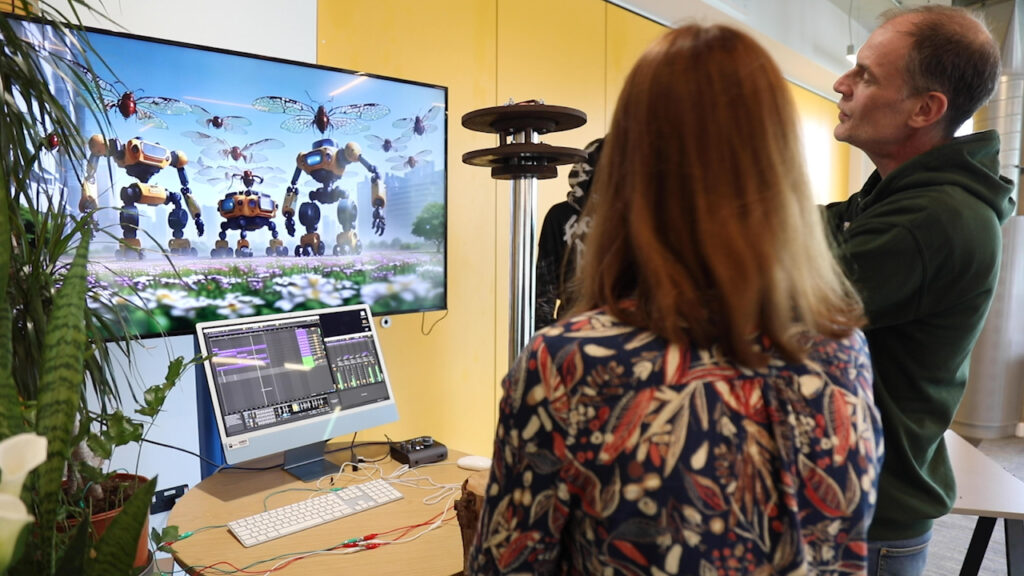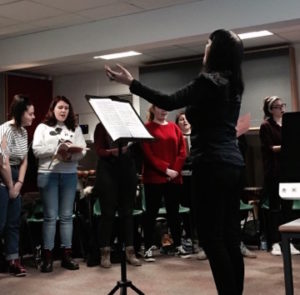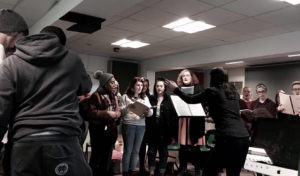
In this short video Learning Technologist Belinda Green speaks to Mark Thursby, a Senior Lecturer in Music, and two of his music students about their experimental sound installation “Of Sound Mind” presented at the University of Northampton on May 16th and 17th, 2023.
Mark explains how anything conductive can be converted into MIDI notes and music, allowing humans to interact with the installations by touching conductive elements such as leaves. The result was an AI insect hybrid garden that generated unique sounds and created an immersive experience. The installations also had the ability to daisy chain people, where participants could hold hands and the last person could touch a leaf to activate the system.
Belinda speaks to music students Ben Wyatt and Kai Downer who discuss the effectiveness of background sounds, such as a café or a public space to create an immersive surround sound atmosphere and how conductivity and human interaction can be used to create immersive sounds that are ‘in key’ using new technologies.
The interview highlights the captivating and interactive nature of the “Of Sound Mind” installations. The fusion of music, AI technology, and interaction created an immersive experience for participants. The enthusiasm expressed by the interviewees showcased the exciting possibilities that lie ahead, particularly for students and the advancement of music technology.
Case study produced by Richard Byles and Belinda Green.
By Dr. Jasmine Shadrack, Senior Lecturer in Popular Music, FAST
 As this year’s choir have been asked to perform at the opening ceremony of Waterside, as well as our own performance at the Royal next June, it was important to choose a piece of music that had the wow factor. And for me, that has to be Mozart’s Requiem Mass in D Minor. It was the first piece I ever conducted so I have very fond memories of it. I have also performed it myself as a soprano during my undergraduate degree so my knowledge of it is intimate. The fact that Mozart knew he was dying when he wrote it, makes the piece all the more poignant and special.
As this year’s choir have been asked to perform at the opening ceremony of Waterside, as well as our own performance at the Royal next June, it was important to choose a piece of music that had the wow factor. And for me, that has to be Mozart’s Requiem Mass in D Minor. It was the first piece I ever conducted so I have very fond memories of it. I have also performed it myself as a soprano during my undergraduate degree so my knowledge of it is intimate. The fact that Mozart knew he was dying when he wrote it, makes the piece all the more poignant and special.
The music for it will take a longer time to come together but the choir are making great strides already. We have completed (in the most part!) the Aeternam and the Kyrie Eleison (the first two movements) as well as learning some traditional Christmas carols too (for a lunch time concert later in the term). This time I am joined by a new member of staff, Miss Francesca Stevens who does a two hour vocal training session a week to support what I do every Monday in choir rehearsal. Already I have noticed the bond starting to form, not just between each section of the choir, but as a unit too. One of the things I love most about doing this is watching everyone work together for a common goal. It is active blended learning at every stage, from the rehearsals all the way through to the performance. Not only do they learn close score reading, sight reading , close part harmony, how counterpoint functions, effective breathing techniques, good pronunciation, professional conduct and critical listening, they also forge real solidarity as a cohort that spans across all years of the popular music undergraduate degree.
They are able to exercise their own autonomy by using their voice. This might sound simplistic but it really helps to acknowledge that one voice can have a huge impact on a choir. Through their subjective involvement, they take part and contribute to an objective goal so it is experiential. They also gain empowerment through their learning community. As the choir is voluntary, it means that they are there because they want to be and they are not doing it for assessment purposes. I have tried making it assessable previously and it just didn’t work; it actually undermined all the camaraderie and fun we have with it. There is a real sense of inclusivity too that reflects on their personal responsibility to the choir.
So, at week three of the choir in term 1, we are making great progress and having fun at the same time!
Jasmine will be keeping us up to date with the progress of the choir, but this post is also one in a series of ABL Practitioner Stories, published in the countdown to Waterside. If you’d like us to feature your work, get in touch: LD@northampton.ac.uk
Recent Posts
- Blackboard Upgrade – February 2026
- Blackboard Upgrade – January 2026
- Spotlight on Excellence: Bringing AI Conversations into Management Learning
- Blackboard Upgrade – December 2025
- Preparing for your Physiotherapy Apprenticeship Programme (PREP-PAP) by Fiona Barrett and Anna Smith
- Blackboard Upgrade – November 2025
- Fix Your Content Day 2025
- Blackboard Upgrade – October 2025
- Blackboard Upgrade – September 2025
- The potential student benefits of staying engaged with learning and teaching material
Tags
ABL Practitioner Stories Academic Skills Accessibility Active Blended Learning (ABL) ADE AI Artificial Intelligence Assessment Design Assessment Tools Blackboard Blackboard Learn Blackboard Upgrade Blended Learning Blogs CAIeRO Collaborate Collaboration Distance Learning Feedback FHES Flipped Learning iNorthampton iPad Kaltura Learner Experience MALT Mobile Newsletter NILE NILE Ultra Outside the box Panopto Presentations Quality Reflection SHED Submitting and Grading Electronically (SaGE) Turnitin Ultra Ultra Upgrade Update Updates Video Waterside XerteArchives
Site Admin


